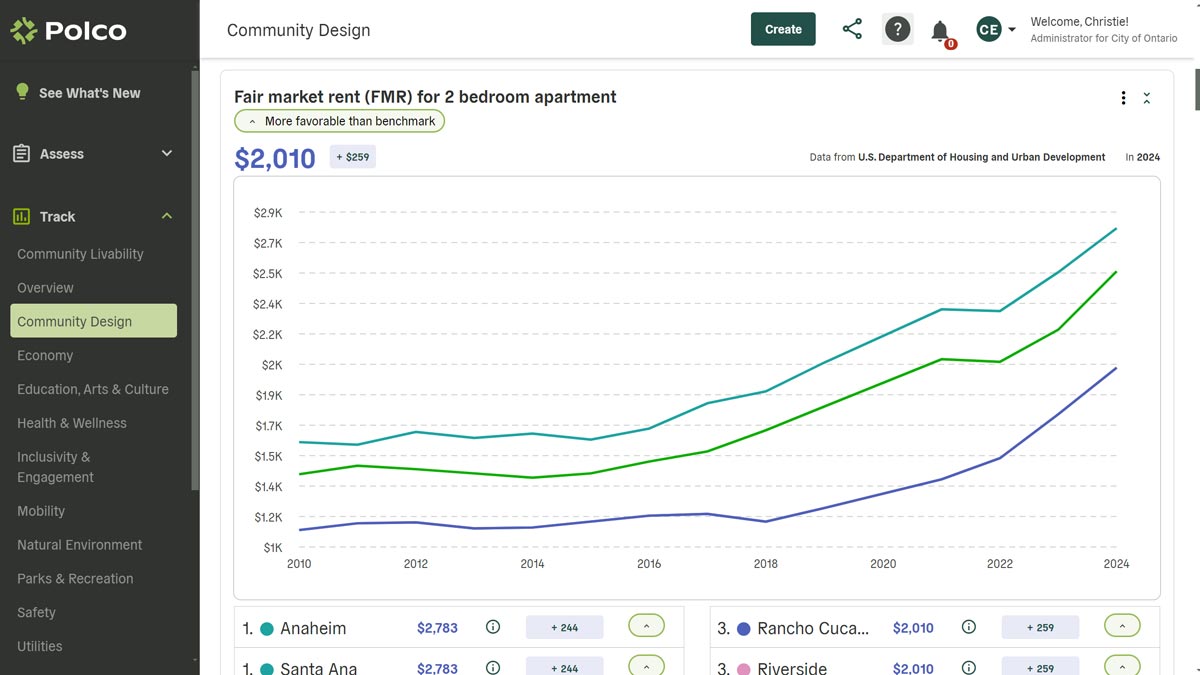The ROI of Results: Making Data Count in Local Government
By Polco on September 29, 2025

In today’s fast-moving and accountability-driven environment, local governments can no longer afford to treat performance measurement as a box-checking exercise. It’s no longer just a best practice, it’s a strategic imperative.
Whether driven by federal frameworks like the Delivering Government Excellence (DOGE) initiative or by rising resident expectations, the message is clear: Communities want results, and they want proof. That proof comes from credible, transparent performance measurement.
The Stakes Are Higher Than Ever
Performance measurement isn’t new. For decades, leaders have built dashboards, scorecards, and benchmarks. But too often, these efforts have produced unused reports and dusty PDFs. In contrast, today’s environment demands that data drive action.
Residents, funders, and agency partners expect local governments to show measurable return on investment (ROI). That means:
- Proving impact, not just activity.
- Showing outcomes, not just outputs.
- Demonstrating that services are not only effective, but also equitable and aligned with community priorities.
The Benefits of Getting It Right
When local governments invest in meaningful performance measurement, they gain much more than metrics. They unlock the power to:
- Build trust by showing residents where their tax dollars go, and what results they generate.
- Drive strategic planning by linking indicators to community-wide goals.
- Make better budget decisions by investing in what works (and defunding what doesn’t).
- Align with funding partners who increasingly demand evidence-based accountability.
What’s Holding Cities Back?
Despite its potential, performance measurement often falls short. Common pitfalls include:
- Tracking too many metrics with little connection to strategy.
- Spending staff time on data collection that doesn’t drive decisions.
- Lacking comparison benchmarks that put data in context.
- Underusing dashboards and data tools.
- Focusing on compliance over learning.
- Avoiding metrics that reveal uncomfortable truths.
A Smarter Way Forward
To move from compliance to impact, governments must change both culture and tools.
Build a Culture of Learning
Shift the internal mindset from "proving success" to "improving performance." This means:
- Encouraging curiosity over perfection.
- Investing in staff data literacy.
- Creating safe spaces to admit shortfalls, and adapt.
Measure What Matters
Don’t just track what’s easy. Focus on what truly reflects community impact. That includes:
- Aligning metrics with strategic goals.
- Measuring outcomes, not just outputs.
- Involving residents in deciding what to measure.
- Avoiding legacy metrics that no longer serve a purpose.
Use Frameworks to Stay Focused
Tools like logic models and structured indicator frameworks keep measurement tied to strategy. For example, Polco’s Track platform organizes metrics across 11 livability domains, like Safety, Economy, Health, and Inclusivity, making it easier to visualize and compare progress over time.
The Power of Benchmarks and Resident Feedback
Objective data is only one side of the story. Resident sentiment is the other half. Tools like Polco’s National Community Survey (The NCS) combine statistically valid feedback with national benchmarks across hundreds of cities. And when paired with Track dashboards, communities gain a powerful way to compare perception and performance side-by-side.
For example, it’s not enough to measure crime rates. Leaders must also ask: “Do residents feel safe?” By combining hard data with human experience, governments get the full picture.
Bringing the Community Voice Front and Center
At Polco, we believe performance measurement must focus on the people it’s meant to serve. Our tools make that easy:
- The National Community Survey (NCS): Scientific resident feedback with national benchmarking.
- Simulation Tools: Real-time input on budgets and trade-offs.
- Engage Pulse Surveys: Fast feedback on timely issues.
- Taxpayer Receipt: Personalized breakdowns of where taxes go.
These tools help governments do more than measure, they listen.
Measuring ROI, Delivering Results
In today’s climate, performance measurement is about more than internal improvement, it’s about public legitimacy. Governments that can show measurable outcomes (not just how many services they provide, but the impact those services have) will be better positioned to:
- Win grants.
- Secure public trust.
- Build partnerships.
- Improve resident lives.
Final Word: Results Are the ROI
Performance measurement is no longer optional. It’s the foundation of modern governance. With the right tools, frameworks, and culture, local governments can shift from measuring activity to demonstrating impact.
Polco helps make that shift possible by combining resident voice, performance data, and AI-powered insight to give communities the clarity and confidence they need to lead.
Explore how your community is performing (and how to improve it) with Polco’s platform.
Popular posts
Sign-up for Updates
You May Also Like
These Related Stories

How Resident Feedback Can Help You Build Community Resilience

How Fate Increased Sales Tax Revenue With Economic Improvements



